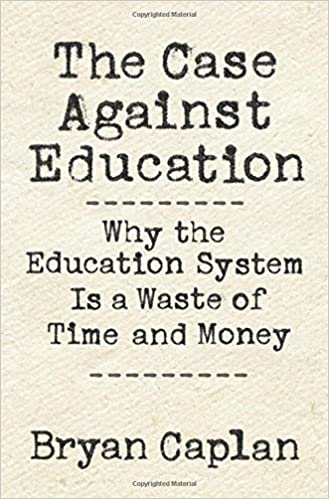Bryan Caplan – The Case against Education Audiobook (Why the Education System Is a Waste of Time and Money)

This is an essential publication, one which all educators, parents, students, taxpayers and plan manufacturers should read as well as soak up. The Case against Education Audiobook Free. The title is a bit overwrought yet the topic is of substantial importance as well as the factors of guide are said rigorously. Bryan Caplan is a Berkeley/Princeton-trained economic expert who shows at George Mason. He is a libertarian by political inclination however he says that his views on education were formed long before his sights on politics were. As an economic expert he often claims points that seem crass; at the same time, as an economist, he claims things that are supported by the data even though we may not want to hear them.
The crucial argument issues work abilities as well as the reality that American education (including college) does not prepare pupils for jobs in the real life. Their coursework is still based upon 19thc (and also earlier) models in which individuals were educated to be clergymen, medical doctors or legal representatives. That coursework is now mostly outdated, unnecessary, dull and also out of touch with both trainee interests as well as the jobs that they may (reasonably) seek. Every person researches history yet there are extremely couple of tasks for chroniclers and also the vast majority of students fail to remember whatever history they could have found out in college. Hence, their time as well as tuition bucks are wasted; they suffer through tiresome material as well as, currently, in their adulthood, don’t understand any type of background anyhow.
So why most likely to university, when college does not, in many cases, prepare you for useful job? (Note that a great number of STEM-trained pupils do not wind up operating in STEM-related fields.) The solution hinges on the nature of the labor market. Employers look for three qualities in prospective staff members: intelligence, conscientiousness as well as the ability to conform. They want brilliant people who have demonstrated their ability to use themselves, continue job, do what is expected of them, take orders from superiors as well as operate successfully in a setting which might be dull, soporific and also tedious. Being able to safeguard a high school diploma and/or having the ability to safeguard an university degree are central to that procedure. Official education and learning, which is completed, signifies the student/ candidate’s capacities in this regard. What you found out is of much less relevance than what you have actually shown that you are able to do (in a setting that might well bear no relationship to the work for which you are applying). Professor Caplan approximates the amount of ‘return’ based upon signaling at around 80%.
Given the general public investment in education and learning and also the vacuity of the procedure itself we need to focus rather on those essentials which will certainly pay off in the world of work– analysis, composing and maths– and carry our now-wasted resources somewhere else. The factors are made in about 300 pp. of closely-reasoned message, with bar graphs galore as well as number-crunching aplenty.
While the author argues that he is not the philistine he may appear to be at first sight, he does say that many trainees are philistines and that they have really little passion in the conventional components of the liberal arts curriculum. He sees the value in these locations of study yet the pupils as well as the marketplace do not. Take, for instance, the study of international languages. The easy reality is that there are extremely few jobs in the world for translators (vs. plumbing professionals, auto mechanics and also electrical experts, e.g.). A lot of students do not take pleasure in the research of foreign languages and almost never ever get real fluency in those languages. It is certainly real that a specific might study Italian in order to have the ability to read Dante, however the number of such individuals exist in this globe as well as to what degree should we bend our educational program in order to in some way lure or convince or encourage a specific or 2 to have such an objective? The numbers are all on his side as is the experience of all faculties young and old. I believe that most greater ed instructors will certainly agree with this and that they will additionally say that the issue has gotten worse and worse as an increasing number of pertained to college out of the requirement developed by credential creep.
In some ways I think that he understates the problem. When he discusses called for senior high school courses he discusses Latin as well as Greek, e.g. The liberal arts core which bores college students is currently greatly non-existent in ‘top’ schools. Bryan Caplan – The Case against Education Audio Book Download. The introductory training courses are mainly shown by contingent professors and grad assistants, because tenure track professors are neither curious about instructing them nor– in a day of hyper specialization– in fact capable of teaching them. It is likewise the situation that the programs taken outside of pupils’ majors are almost always introductory programs, to ensure that trainees look at PowerPoint slides (or, preferably, have the instructor’s lecture notes emailed to them so that they need not go to class), memorize bullet points (or ‘research sheets’) for the examination and after that immediately forget the material forever.